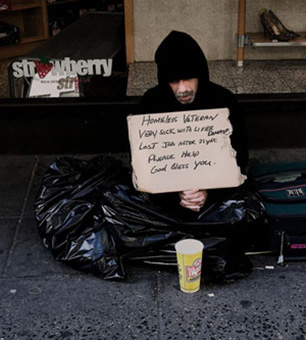No, I’m not here to argue that veterans don’t deserve a holiday (unlike, say, Columbus), but it can be maddening to see a day devoted to veterans when it seems like an empty gesture on the government’s part. If the United States were really committed to its troops after they complete their tours of duty, why are veterans facing so many hardships back at home? How can we read stories like this one about a homeless veteran who received a citation for looking for food in a trash can and claim that we are taking care of soldiers who once took care of us?
Here are seven things veterans could use more than a holiday:
1. Housing
The number of veterans that return to America with no place to live is alarming. Through a variety of circumstances, 13% of the United State’s homeless population is composed of veterans. Worse yet, more than half of these homeless veterans have a disability. While there are veteran housing programs in place, the fact is that more than 60,000 veterans can find themselves homeless each year and twice that number are at risk of of losing their housing. Additionally, veterans are not exempt from the foreclosure crisis, with many veteran families fighting to keep their homes.
2. Jobs
Troops who come home from war should have plenty of valuable skills for the job market, but unfortunately hiring companies don’t always see it that way. The unemployment rate for post-9/11 veterans currently stands at 10 percent, significantly higher than the 7.2 percent rate for the general population. Long-term unemployment is even more drastic for veterans. Of recent jobless veterans, 34 percent have been unemployed for a year, with 17 percent going without a job for more than 2 years. Obviously, it can be difficult for veterans to integrate into non-military life without financial stability.
3. Reliable Health Care
Medical coverage from the Department of Veterans Affairs has become a bureaucratic joke. Paperwork is so backed up that nearly 250,000 veterans are waiting more than a year to even have their health claims even processed.
Clearly, it is unacceptable for people who were injured fighting for our country to have their physical ailments unattended, but it is similarly upsetting to learn that soldiers undergoing mental health afflictions are also going ignored. Cases of PTSD are on the rise, but soldiers still face a stigma for reporting such problems. The fact that even soldiers who step forward to say, “I need help” are not receiving the care they not only need, but have earned, is a disgrace.
4. Drug Counseling
The stress of the military experience and readjusting to civilian life puts veterans at a heightened risk for substance abuse. One study found that 39 percent of soldiers coming back from Iraq and Afghanistan tested positive for “probable alcohol abuse.” Certainly, it doesn’t help that the military intentionally ignores rampant drug and alcohol use during service, leaving soldiers with a substance habit. In fact, an astonishing 1 in 8 troops are referred to counseling for alcohol problems after being deployed. Offering veterans a life free of addiction should be a top priority.
5. Options That Don’t Lead to Jail
Many know that the United States has the highest incarceration rate in the world, but another statistic that is rarely cited is that nearly 10 percent of inmates are veterans. That’s right, approximately one million veterans are currently in prison. Some speculate that the high incarceration rates are due to the fact that the soldiers become violent through military aggression or struggle when the structure is removed from their lives. Then again, it shouldn’t be surprising to see veterans who are homeless, jobless, addicted to drugs and dealing with mental afflictions turning to crime.
6. Food Stamps
900,000 veterans rely on food stamps to feed their families. Alas, recent budgetary changes have cut the benefits by an average of $133 per recipient. The fact that so many veterans receive this assistance should be a major point of contention for the usual conservative argument that people on food stamps are lazy moochers. Surely, it can’t be the GOP’s assertion that people who put their lives on the line for the country are good-for-nothing takers. Nevertheless, if House Republicans have their say, they’ll slash the food stamp program by an additional $40 billion in the coming weeks, leaving the nearly one million veterans with limited options for feeding themselves.
7. Fewer Compatriots
It seems like with all of the problems America faces in taking care of its veterans, the priority should be in spending money to address veteran affairs rather than starting new wars that generate additional veterans. It’s pretty deplorable to send troops abroad under the promise of the government taking care of them once they return only to fail on that pledge later.
At the current rate the United States engages in warfare, there will be no shortage of veterans in the coming decades. Respect for veterans begins with the wars we choose to send them to. Military lives should not be risked to appease war profiteers, spread imperialism or gain access to oil. It’s no wonder that a growing number of veterans are speaking out against the country’s stance on war.
This Veterans’ Day, let’s challenge our government to actually do right by our veterans rather than declaring a holiday with no substantial action.
Join us in defending the truth before it’s too late
The future of independent journalism is uncertain, and the consequences of losing it are too grave to ignore. We have hours left to raise the $12,0000 still needed to ensure Truthout remains safe, strong, and free. Every dollar raised goes directly toward the costs of producing news you can trust.
Please give what you can — because by supporting us with a tax-deductible donation, you’re not just preserving a source of news, you’re helping to safeguard what’s left of our democracy.
